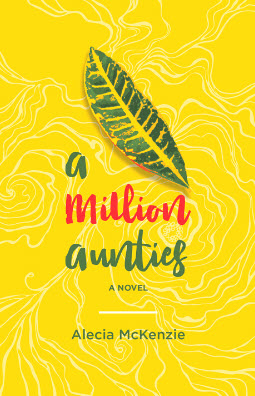| <- Back to main page |
A Jamaican writer currently living in France, Alecia McKenzie writes about people with strong ties to Jamaica—Americans of Jamaican descent, Jamaicans living in America, an American who married a Jamaican, and Jamaicans living in, and visiting, France. Through them, through their eyes, she offers insights into the varying influence of Jamaican culture on their lives.

Though a slim volume, her latest novel, A Million Aunties, provides a delicious and multithreaded tale—an exploration of the lives of a small group of people whose lives intertwine in interesting and subtle ways.
It falls to each character to tell his or her own story. Because of their interwoven nature, at times we revisit some story events, and see them from a new perspective. This challenges the reader to rethink the events, reinterpreting them, either in the light of new information, or simply because they are shown through new eyes—enhanced, emphasized, or diminished by both personal and cultural factors.
No particular grand plot emerges in Aunties. We meet and live through events with our multiple protagonists, each facing unique challenges. The drama arises spontaneously from their interactions with the world and the other characters. Of course, things happen, people make choices, grow and change. The inevitable conflicts arising in the story lead to resolutions, but not all resolutions resolve things.
Location informs a story, and this one alternates among three dissimilar worlds. In those parts of the story that take place in Jamaica, the author effortlessly evokes walking through a rural, poor area of that Caribbean island, sensing the touch of soft breezes caressing your skin, refreshing you on sticky hot days; feeling the approach an oncoming squall, hearing the sounds of birds and the scavenging dogs, and people chatting—speaking a patois that ranges from charming to confusing.
For Chris, a New Yorker who has come to the island to paint, Jamaica is a culture shock, but one he embraces. Although he is a successful artist, Chris’s life is in disarray due to the abrupt and violent death of his wife. Needing to move on, to find meaning in life without her, Chris lets Stephen, who is both his friend and art dealer, convince him to go to Jamaica. He’s only been there once, as a small child visiting with his mother. This time, he is to stay with Stephen’s Auntie Della and work.
Chris needs to learn to paint flowers. Flowers, growing things, are vital to the sense of this story. Auntie Della loves growing things as much as Chris’s late wife, and the story emphasizes their beauty and fragile nature.
The motivation to take on the particular challenge of painting flowers is partly one of closure. His late wife often teased him because the one thing he never learned to paint was the thing she loved most.
“Have you tried painting flowers?” she asked him once. And he’d laughed. He knew the subjects he could paint, and flowers weren’t among them. But, yes, he had tried, many times, and the damn things had come out looking like evil birds, or mangled rolls of toilet paper, and he had to admit he didn’t have that delicacy of touch that made petals look like petals.
After her death, that failure torments him; perhaps learning to bring flowers to life on the canvas will please her. He’s certain he will know when he has pleased her, because she looks over his shoulder when he paints, teasing him.
Our passions color how we see the world, and McKenzie unfolds Chris’s story in ways that show how an artist, a painter, views life. Called back to the US when his father has a heart attack, Chris goes to the hospital and waits in his father’s room for news about his operation. Worried and bored, he notes his surroundings:
He stares out at the high, rectangular clothes closet in front of him. It’s a pale shiny blue with a pale gray door. An ugly thing as furniture goes.
Later, Stephen returns to Jamaica for his own visit. Seeing that world through his eyes, we learn more about the meaning of the title. The term “Auntie” shows respect for an older woman who provides support, someone who acts as toward you as a family member would. When Stephan makes his own visit to Jamaica, he’s met by a man named Brandon. Auntie Della tasked him with picking Stephen up at the airport.
Caught up in the moment, Aunt Della hugged Brandon too.
“Thanks for bringing him home in one piece,” she laughed.
“No problem, Auntie,” Brandon beamed.
So, he was calling her Auntie, too? Stephen was amused. He wondered what Chris had ended up calling her.
Of course, Chris called her Auntie too; he found Jamaica filled with nurturing, caring Aunties.
Unfortunately, after introducing so much, the ending feels rushed—an ensemble attempt to pull the pieces together. I wish McKenzie had followed the tendrils of story further, given us more, so we could learn more of the consequences of the choices the characters make. She laid the groundwork wonderfully.
Alecia McKenzie is a winner of the Commonwealth Prize for her short story collection, Satellite City, and the novel Sweetheart.
- Ed Teja